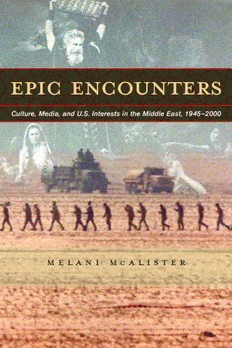
Epic Encounters: Culture, Media, and U.S. Interests in the Middle East, 1945-2000 (American Crossroads) PDF
376 Pages·2001·4.449 MB·English
Most books are stored in the elastic cloud where traffic is expensive. For this reason, we have a limit on daily download.
Preview Epic Encounters: Culture, Media, and U.S. Interests in the Middle East, 1945-2000 (American Crossroads)
Description:
In the last half of the twentieth century, cultural products--from films and news reports to museum exhibits and novels--profoundly shaped ideas about the relationship between Americans and the Middle East. In this innovative book, Melani McAlister explores the cultural history of political interests, arguing that U.S. encounters with the Middle East were influenced by both the presence of oil and the religious symbolism of the region. McAlister's richly textured study shows how culture functions as a social and historical force in shaping politics and identity. She skillfully weaves lively and accessible readings of popular culture with a rigorous analysis of U.S. foreign policy and the domestic politics of race. McAlister begins by situating the postwar development of U.S.-Middle East relations, including the rise of anticolonialism and the establishment of the state of Israel. Subsequent chapters consider specific events and cultural texts such as the epic film The Ten Commandments, the King Tut museum exhibit, writings from the Black arts movement, the U.S.-Iranian hostage crisis, and the 1990-1991 Gulf War. In each of these cases, McAlister demonstrates how representations of the Middle East have been a site of struggle over both the nature of U.S. foreign policy and the construction of race, religion, and gender within the United States.Truly interdisciplinary, this work will appeal to a wide audience as it illuminates the significant intersection of culture and politics that is at the heart of both nationalism and globalization.
See more
The list of books you might like
Most books are stored in the elastic cloud where traffic is expensive. For this reason, we have a limit on daily download.
